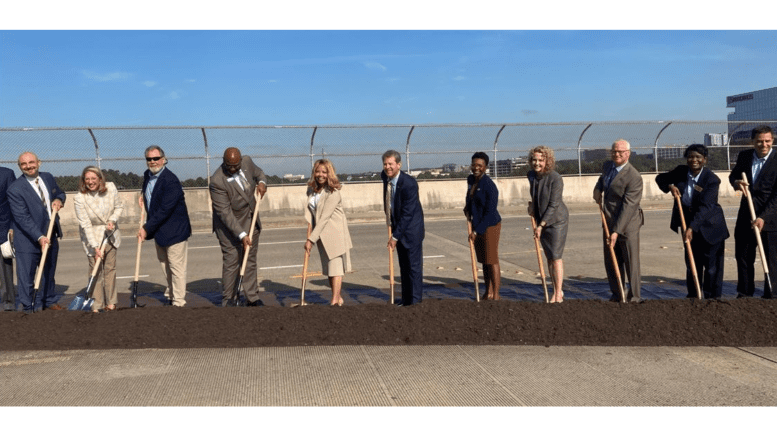The Cumberland Community Improvement District and the Georgia Department of Transportation held a groundbreaking ceremony for a new access ramp to the Northwest Corridor Express Lanes.
The new ramp begins at Akers Mill Road (see our earlier article about the bridge closure on Akers Mill Road earlier today for the start of the work).
The new access ramp is the newest of 12 access points for the express lanes.
This particular project will provide an exit for the southbound express lanes in the morning and as a northbound entrance ramp in the evening.
“With travel times approximately 20 percent faster than the general-purpose lanes, the Northwest Corridor Express Lanes have transformed the way residents of Cobb and Cherokee counties commute to and from work along I-75,” said Georgia Governor Brian Kemp for the news release about the project. “The Cumberland area has an annual economic impact of $20 billion on Georgia’s economy, and this new access point will provide safe and easy access to the Express Lanes for those who live and work here.”
“Today’s groundbreaking is a marquee achievement for the Cumberland CID,” said John Shern, Chairman of the CCID Board of Directors. “The Akers Mill Ramp will be a critical, access point to help get people in and out of our community both effectively and safely. It’s no secret that Cumberland is growing in all sectors, allowing the Ramp to serve the thousands of businesses, residents, and visitors in the region. I’m proud of the Cumberland CID’s commitment to bring together the necessary partners and stakeholders to plan, fund, and construct successful projects like the Akers Mill Ramp to help enhance the future and success of Cumberland.”
“We have seen tremendous usage of the Northwest Corridor Express Lanes since their opening in 2018,” said Georgia DOT Commissioner Russell McMurry. “One of our goals at the Georgia DOT is to ensure the projects we are completing improve safety for Georgia motorists. By creating this new access point, commuters will have a safer and more efficient way to access the Express Lanes system from the Cumberland area.”
The Cumberland Community Improvement District is a major commercial activity center and one of the largest employment centers in Georgia.
The district has over 3,400 businesses and 29,000 residents.
According to the GDOT press release:
The Georgia Express Lanes systems are dynamically priced, meaning as demand for use of the lanes increases, the toll amount rises to ensure that motorists experience more reliable trip times.
“The Northwest Corridor Express Lanes project has been a tremendous success in moving people both through and into Cobb County,” said Cobb County Chairwoman Lisa Cupid. “This new ramp will finally allow access into a popular destination for people visiting our county and help us manage flow in and out of the area as the attractions here grow and prosper. The efforts of all the stakeholders who worked to make this a reality is greatly appreciated.”
“Overall, this project improves mobility and the reliability of commutes facilitating direct, safe access to the Northwest Corridor Express lanes for daily commuters traveling to and from the Cumberland area,” said Chris Tomlinson, SRTA Executive Director. “Given Cumberland’s regional economic importance, this project represents what GTIB is all about – partnership with local, state and federal funding partners to deliver difference-making transportation projects together. The collective investment by all the partners contributes to Atlanta’s Regional economic development making the project extremely impactful to the area.”
“The Atlanta Regional Commission was proud to partner with the Cumberland CID and allocate funding for this project, which will improve mobility and safety in one of the region’s most important economic hubs,” said Mike Alexander, Senior Director of the Center for Livable Communities at the Atlanta Regional Commission. “This is another example of the Cumberland CID’s commitment to making the innovative investments needed to keep this fast-growing area a great place to live, work and play.”
The press release described the layout of the ramp:
The ramp will include gates on both ends to ensure safety for reversible directions of travel. The ramp will be 24-feet wide for the reversible lanes plus break-down shoulders and will widen to 50-feet at Akers Mill. It will include a barrier separated entrance to the northbound managed lanes.
Phase I of this project, which included widening of the I-285 bridge over I-75, was completed in 2018 and was funded through Georgia DOT’s existing Northwest Corridor construction contract. The second phase of this project, estimated to cost $18.2 million, which consists of constructing the ramp, is anticipated to be complete in 2023.
About the Georgia Department of Transportation
The GDOT describes itself as follows:
Georgia Department of Transportation plans, constructs and maintains Georgia’s state and federal highways. We’re involved in bridge, waterway, public transit, rail, general aviation, bike and pedestrian programs. And we help local governments maintain their roads. Georgia DOT and its nearly 4,000 employees are committed to delivering a transportation system focused on innovation, safety, sustainability and mobility. The Department’s vision is to boost Georgia’s competitiveness through leadership in transportation.
The GDOT’s governing body is the 14-member State Transportation Board. The board is chosen by the state legislative delegations of each of the 14 congressional districts in Georgia. The board members serve five-year terms.
The board is currently chaired by Emily Dunn from the 9th Congressional District.
The State Transportation Board chooses the commissioner, currently Russell R. McMurry.




